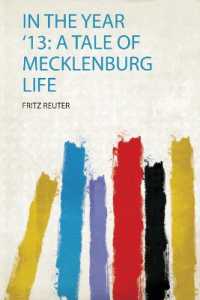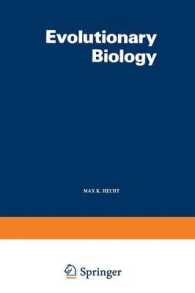基本説明
The first group of papers includes discussions of the policies of the European Central Bank. The second group analyzes specific problems of Poland, Hungary, the Czech Republic and the Slovak Republic.
Description
(Text)
This volume contains, for the most part, the papers and their formal discussions presented at an International Symposium "EUFORIKZ" (EURO, FORINT, KRONE, ZLOTY), held at Gerhard-Mercator-University Duisburg, Germany, on October 26-28, 2001. The focus of the volume lies on the following two questions:
Firstly, which lessons can the Visegrad countries draw from exchange rate theory to choose the best strategy for monetary integration into the European Union? Secondly, which specific problems do the Visegrad countries face in their exchange rate policies?
The first group of papers includes discussions of the policies of the European Central Bank, a general discussion of possible alternative options for the monetary integration of the accession countries, a discussion of the optimum currency area criteria with an emphasis on the endogeneity hypothesis, a discussion of inflation targeting and the proposal for euroization. The second group of papers analyzes specific problems of Poland, Hungary, the Czech Republic and the Slovak Republic on their way towards the accession to the European Union as well as towards the fulfillment of the Maastricht convergence criteria.
Der Tagungsband enthält die Ergebnisse eines Internationalen Symposiums "EUFORIKZ", das vom 26.-28. Oktober 2001 an der Gerhard-Mercator-Universität Duisburg stattfand. Dabei standen folgende Fragen im Vordergrund des Interesses:
Erstens, was können die Visegrad Länder von der Wechselkurstheorie für ihre eigene wechselkurspolitische Strategie lernen? Zweitens, mit welchen spezifischen Problemen haben diese Länder in ihrer Wechselkurspolitik zu kämpfen?
In der ersten Gruppe der Beiträge werden Themen wie die Politik der Europäischen Zentralbank, die möglichen Alternativen für die monetäre Integration der Beitrittsländer, die Anwendung der Kriterien eines optimalen Währungsraumes unter Betonung der Endogenitätshypothese, inflation targeting sowie der Vorschlag der euroization behandelt. Die zweite Gruppe der Beiträge beschäftigt sich mit spezifischen Problemen Polens, Ungarns, der Tschechischen Republik und der Slovakischen Republik auf ihrem Weg in die Europäische Union wie auch auf dem Weg zur Erfüllung der Maastrichter Konvergenzkriterien.
(Table of content)
Inhalt: J. Jerger, The Monetary Policy of the ECB: Observations and Issues - P. Backé / C. Wójcik, Alternative Options for the Monetary Integration of Central and Eastern European EU Accession Countries - J. Fidrmuc, The Endogeneity of the Optimum Currency Area Criteria, Intraindustry Trade and EMU Enlargement - C. Klisz, Are the Inflation and Exchange Rate Targets for Joining the European Single Currency Inconsistent? - J. Horvath, Comments on Unilateral Euroization - A. Budnikowski / R. Wieladek, Polish Economy of 1990s in Perspective of the Convergence Criteria - K. Dezséri, Exchange Rate Regime of Hungary and Approaching EMU Membership - J. Pöschl, Implications of the Introduction of Euro. The Case of the Czech Republic - J. Horvath, On Currency and Exchange Rate Regime. Example of Slovakia
(Table of content)
Inhalt: J. Jerger, The Monetary Policy of the ECB: Observations and Issues - P. Backé / C. Wójcik, Alternative Options for the Monetary Integration of Central and Eastern European EU Accession Countries - J. Fidrmuc, The Endogeneity of the Optimum Currency Area Criteria, Intraindustry Trade and EMU Enlargement - C. Klisz, Are the Inflation and Exchange Rate Targets for Joining the European Single Currency Inconsistent? - J. Horvath, Comments on Unilateral Euroization - A. Budnikowski / R. Wieladek, Polish Economy of 1990s in Perspective of the Convergence Criteria - K. Dezséri, Exchange Rate Regime of Hungary and Approaching EMU Membership - J. Pöschl, Implications of the Introduction of Euro. The Case of the Czech Republic - J. Horvath, On Currency and Exchange Rate Regime. Example of Slovakia








